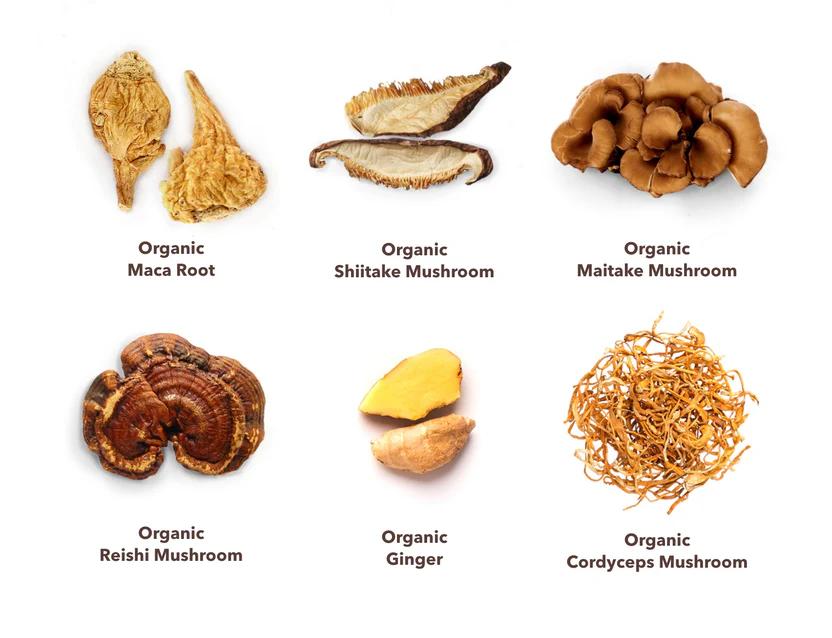Discover 6 adaptogens in Ka’Chava
These powerful plants are basically nature’s way of helping your body hit the reset button

What are Adaptogens?
Adaptogen is the term used to describe a group of plants (certain herbs, roots, and medicinal mushrooms) that help your body react to and recover from physical, mental, and environmental stressors. The effect is subtle, but many people swear by their benefits—and they’ve been used for centuries in Traditional Chinese Medicine and Ayurveda to restore balance.
Adaptogenic plants are believed to restore homeostasis by adapting their functions to your body’s specific needs. For example, if you’re too amped up, adaptogens may help calm you down; and if you’re feeling run down, they may help subtly elevate your energy.
While each individual adaptogen has slightly different properties and benefits, they’re all believed to exert a normalizing effect on the body, helping to bring you back to a healthy, balanced state.

How we think adaptogens work
The term “adaptogen” dates back to the 1940s when researchers were looking for ways to keep Russian soldiers and workers energized and resilient in extreme climates. This gave rise to research into plant medicines and the discovery of plants that exhibited adaptogenic effects, like Rhodiola rosea. Since that time, a number of other plants have been categorized as adaptogens, based on their similar effects on the body.
While more research is needed on adaptogens, some experts believe certain adaptogens work by interacting with a part of your body called the hypothalamic-pituitary-adrenal (HPA) axis, which governs the body’s fight-or-flight response to stress. When a person experiences a stressor—whether it’s a work deadline, too many social or family responsibilities, or any type of dangerous situation—the HPA axis activates and triggers the release of hormones such as cortisol, which prepare your body for action.
Adaptogens are beneficial because—to a certain extent—they appear to hit the reset button on an overactive HPA axis and support a more balanced stress and immune response.

What Adaptogens are in Ka'Chava?
The adaptogens in Ka’Chava include maca root, reishi mushrooms, cordyceps mushrooms, maitake mushrooms, shiitake mushrooms, and ginger root. Learn more about each one below.

Maca Root
Native to the rugged terrain of the Andes mountains, maca root’s popularity for everything from improving energy to enhancing libido spans centuries—and a growing population swear by its benefits today.
Mushrooms
There are a variety of mushrooms that many experts classify as adaptogens, including shiitake, maitake, reishi, and cordyceps. Many medicinal mushrooms contain compounds that support immune health, including polysaccharide compounds like beta-glucans.
Ginger Root
The spicy root that’s often attributed to improved digestive health appears to have adaptogenic qualities as well. While research on ginger as an adaptogen isn’t robust, preliminary studies suggest that ginger influences the HPA axis.

The Bottom Line…
Consuming adaptogens regularly is a simple way to support your resilience to stress and help restore mind-body balance—something we could all use more of lately. Often, you can find adaptogen blends sold as powders and capsules or incorporated into food products (like Ka’Chava), but you can also find supplements containing specific adaptogens that may offer more focused benefits such as supporting energy and stamina. It may take some trial and error before you find the one that works best for you.



